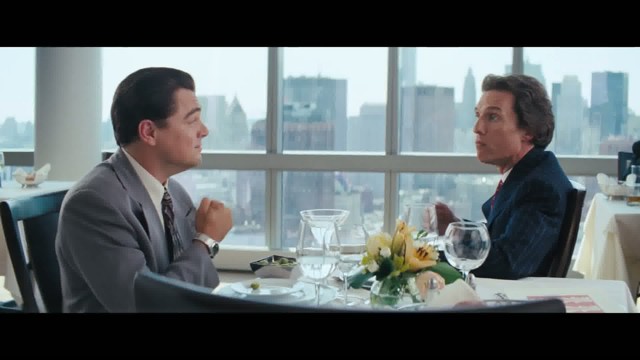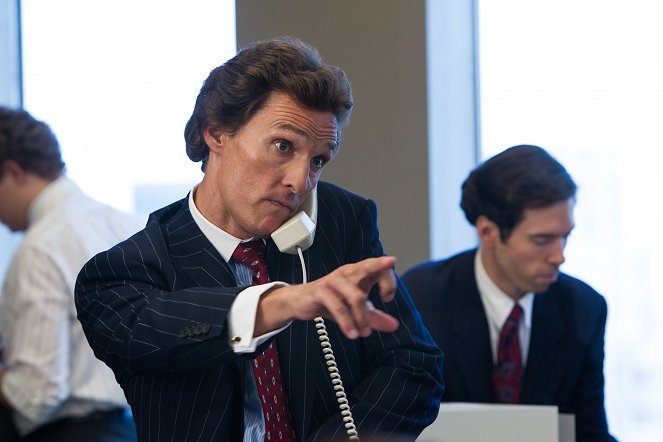Directed by:
Martin ScorseseScreenplay:
Terence WinterCinematography:
Rodrigo PrietoComposer:
Theodore ShapiroCast:
Leonardo DiCaprio, Jonah Hill, Margot Robbie, Matthew McConaughey, Kyle Chandler, Rob Reiner, Jon Bernthal, Jon Favreau, Jean Dujardin, Joanna Lumley (more)VOD (5)
Plots(1)
Revered filmmaker Martin Scorsese directs the true story of New York stockbroker Jordan Belfort (Leonardo DiCaprio). From the American dream to corporate greed, Belfort goes from penny stocks and righteousness to IPOs and a life of corruption in the late 80s. Excess success and affluence in his early twenties as founder of the brokerage firm Stratton Oakmont warranted Belfort the title – "The Wolf of Wall Street." (Universal Pictures UK)
(more)Videos (39)
Reviews (19)
A three-hour long joyride full of sex and cocaine, cool and base at the same time, trying to hide behind the proverb “sow the wind, reap the whirlwind”. I enjoyed myself immensely and I’ll definitely watch this again, but I don’t consider one dramatic scene (with the daughter in the car) to be enough for a three-hour film. The Wolf of Wall Street has perfect catchphrases and is never boring, but it made me realize that this type of Scorsese movie (starting with Casino) is great to watch but won’t leave you with lasting impression. Shutter Island, dark and mystical, perfectly escalated, with a surprising, sophisticatedly ambiguous ending, is much closer to my heart, and I consider it Scorcese’s masterpiece.
()
What surprised me, and not in a very good way, is that Scorece’s position towards the protagonist is neutral, as if he was saying that ripping people off, doing drugs and shagging whores is kind of fine. That's a pretty big problem for me, as a die-hard idealist. So far, none of Scorsese's films have lacked some kind of catharsis at the end, unfortunately I didn't get it here. I acknowledge the fantastic filmmaking, which on more than one occasion managed to elicit a relieved laugh from me, but otherwise I'd always prefer the stupid postmen who can only afford penny stocks over cunts like Jordan Belfort and his wolf pack. This farce is actually very far from a complex fresco telling something about something.
()
The most fundamental American film since The Social Network. The film is not amoral, what’s amoral is its protagonist and modern society as a whole. He’s an asshole who ended up in prison (for a ridiculously short time), without friends and in debt due to his criminal behaviour and yet he has a relatively normal life, and there are still business people who take him as a role model and eagerly listen to his motivational lectures. Though Scorsese doesn’t portray the main character from an acceptable moral position (after all, Belfort himself is the narrator), after three hours of footage, a sensible viewer can make their own judgement, and thanks to this confrontation, a lively comedy becomes a very caustic satire. Excellent and brisk fun with pretty dark reverberations. Get over it.
()
Leonardo DiCaprio transforms into Matthew McConaughey in this biopic, which chokes on itself. For as long and as fast as The Wolf of Wall Street talks, it ultimately says surprisingly little. Like The Great Gatsby, another attempt to explore the self-destructive potential of capitalism from last year, Wolf also entertained me more with its form than with its content. ___ Scorsese has dealt with the central theme of male frustration arising from the inability to reach the top and stay there several times (most evocatively in Raging Bull). What makes this film different is mainly its tone, degree of excess and greater emphasis on the ritual dimension of boorish behaviour. Sex, drugs and drinking have gained a common denominator in the form of dollar bills, for which anything and anyone can be bought. The film doesn’t condemn money – and there is the question of whether anyone should take it seriously in such a case today. On the contrary, it genuinely acknowledges that money can buy loads of pleasure. The ambiguous final scene with Agent Denham (is he smiling?), who together with Belfort’s first wife is the only one who acts with any sense of morals, leaves it up to us to judge whether he is happy or regretful that he didn’t take Belfort’s offer. (Denham comes across as a being from a different, human world also thanks to Kyle Chandler’s acting). Scorsese puts us in a similar “decide for yourself” position multiple times, e.g. during Belfort’s slow crawl to the Lamborghini. The scene isn’t made humorous with music or with a well-timed cut. It is rather several static shots without musical accompaniment. We are not encouraged to laugh at the protagonist; that’s only somehow expected of us. ___ At the same time, a second viewing of the etude with the Lamborghini, unforgettable thanks particularly to DiCaprio’s physical performance, which is reminiscent of Jerry Lewis and other masters of physical comedy, reinforced my suspicion that Scorsese did not have an entirely clear concept of how to shoot the individual parts of the film and then put them together. With the exception of the aforementioned scene, it more or less applies that the less cool the film is, the more seriously we should take it. The rapid dolly shots, the overhead shots, the slowed or quickened movement, the loud music (the choice of which is governed by whether we are watching the bacchanalia or, for example, another stock-market success) – these are all indicators that Belfort has the narrative fully under his control. From the prologue (white Ferrari, not red), however, Belfort shows himself to be an unreliable narrator who doesn’t tell the truth, or at least not the whole truth. Other characters and the film’s narrative itself have to repeatedly set the record straight and tell us what really happened (the S&M evening, the rampage on the airplane, the return from the Country Club). The scenes without music and Belfort’s boastful commentary, handled using the standard shot-countershot technique, are often more critical of the “hero’s” actions and give the impression that we are receiving facts in a purer form, unfiltered by Belfort’s view. But in “his” scenes, Belfort occasionally commits an offense that an impartial (and absent) film narrator avoids – he puts himself down (eleven-second coitus, self-ironic quoting of Browning’s Freaks). Is that supposed to be a surprising violation of the rules (such as the later conferment of the voice-over to other narrators, namely Saurel and Aunt Emma), or is it proof that the film does not respect any rules in its extravagant indiscipline? ___ Of course, the composition of the plot from various mad incidents is not as random as it may seem. The narrative moves ever forward thanks to the rhythmically well-thought-out introduction of new characters and revealing of new information, and thanks to the intensification of the motifs pointing out the striking contrast (played superbly by DiCaprio) between the Jordan who has ambition and a knit sweater and the Jordan who has everything. Whether The Wolf of Wall Street has a clear concept or not (it probably does, but I didn’t find it even on the second viewing), and whether or not it is sexist in its exploitation of the female body (it probably is, because Naomi uses her sex appeal as a weapon), the new Scorsese film remains an entertainingly provocative black comedy (or horror musical?) that pulsates with incredible (masculine) energy for the whole three hours and likably does not try to foist upon us any moralistic wisdom about the harmfulness of money, egoism and various forms of immoderation. 85%
()
(less)
(more)
I guess I don't like movies where Leo is very rich and indulgent. The fact is that except for a few jokes in the style of The Hangover, it all seemed to me like an opulent cocaine carnival, hiding quite a relevant (and fortunately very subdued) parable about the pernicious appeal of selling pens and a glaring paradox of sweaty balls in the subway, circumscribed elegantly in the last minutes. I appreciate that Scorsese accepts the player's perspective (and not the critique of the system) and does not push the viewer to disgust - Belfort is, of course, a repulsively attractive mediator of the world of speculation. However, the metaphors of the brokerage community as a prehistoric tribe / sect are unnecessarily obvious (although the extravaganza is nice to look at). Also remarkable is the obvious "immorality" of the film, which actually calmly claims that a similar lifestyle is cool in a way - and Scorsese is, of course, right. If he wasn't, the Wolf would have nothing to eat. The best thing about the film in this regard is about 5 minutes, which the brokerage shaman McConaughey hums to a hypnotic rhythm. I have nothing to criticize it for at its core - it plays back the worn out notes confidently and without mistakes, it just didn't speak to me at all with its frenetic cadence. It’s the similar problem of "numbness of sarcasm" that I had with Gavras' more engaged film Capital. At least The Wolf of Wall Street brazenly says, with a smirk, what we all know about the speculative nature of capitalism, admittedly unreliably and without unnecessary rhetorical phrases. And it doesn't burden you with unnecessarily complicated details at all. Why would it, when another reduction is waiting around the corner? But the film still takes 3 hours, in which I did not find enough stimuli. Of course, except for the cocaine, prostitutes, and those damn deceleration pills...
()



Ads